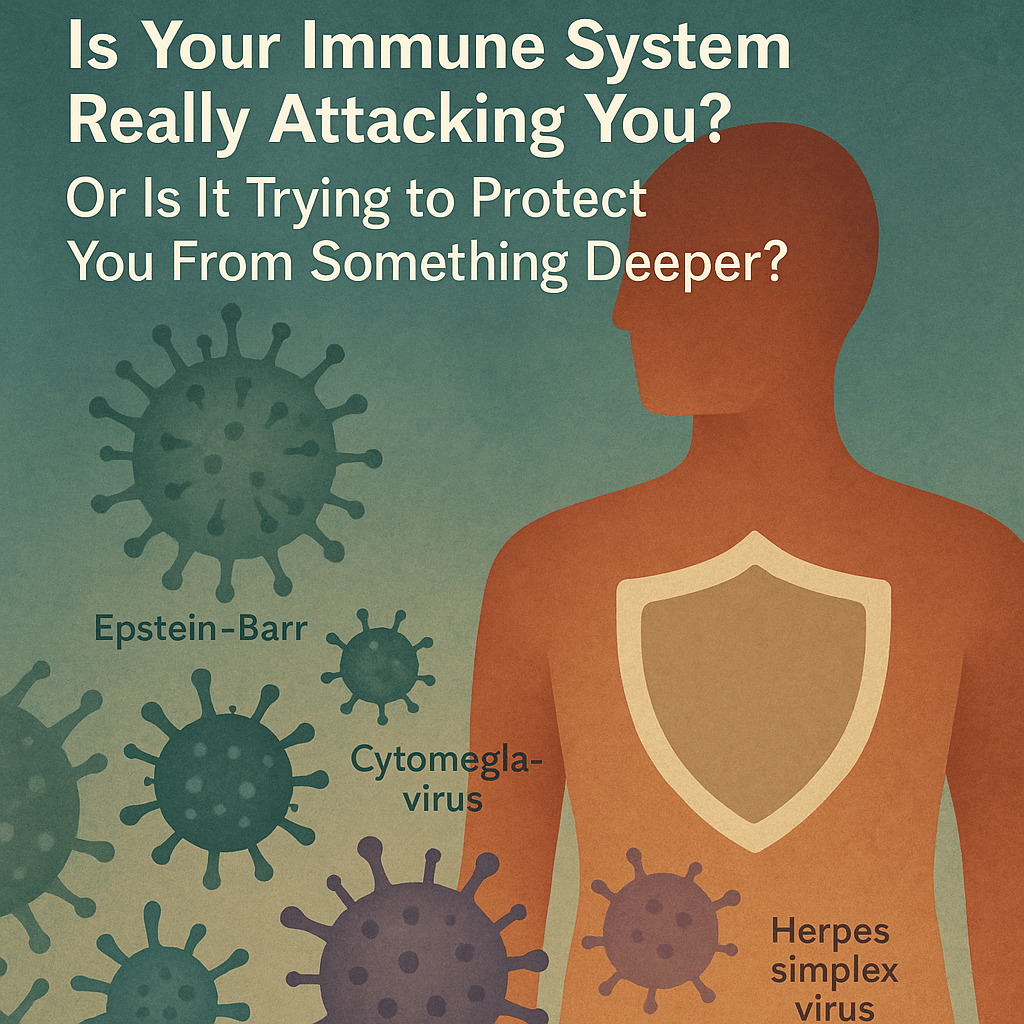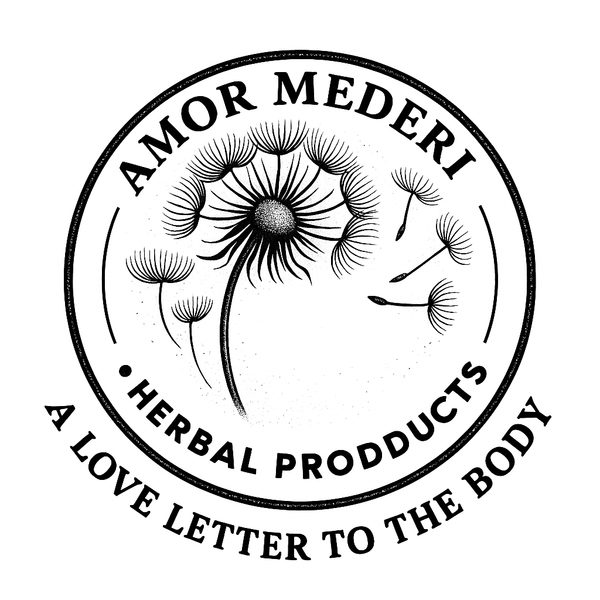
Is Your Immune System Really Attacking You? Or Is It Trying To Protect You From Something Deeper?
When you're told you have an autoimmune condition, it's often framed as if your body has gone rogue — as though your immune system has lost the plot and started attacking your own tissues for no reason. But what if there's more to the story? What if your immune system isn't broken... but responding to something it's sensing beneath the surface?
Recent research points to a fascinating and important link between autoimmune diseases and latent viral infections — particularly viruses like Epstein-Barr virus (EBV), cytomegalovirus (CMV), and herpes simplex virus (HSV). These are viruses that can stay hidden or "latent" in the body for years, quietly influencing the immune system long after the initial infection.
A recent study titled "The Role of Viral Infections in the Onset of Autoimmune Diseases" explores this connection and offers a different lens through which to view autoimmune conditions. Here's a plain-language breakdown of what this study reveals and how you can support your body naturally if this applies to you.
What the Study Found: Viruses May Be Behind Some Autoimmune Diseases.
Researchers have found that in many autoimmune conditions, latent viruses are present in the tissues being attacked. For example, EBV has been detected in the brain tissue of people with multiple sclerosis (MS), and in the joints of people with rheumatoid arthritis (RA). This suggests that rather than attacking the body for no reason, the immune system might actually be targeting tissues that are harboring hidden viruses.
So why does the immune system do this? There are a few mechanisms that help explain it:
1. Molecular Mimicry
This means that a virus has proteins that look similar to your body's own proteins. Your immune system tries to fight the virus, but in doing so, accidentally attacks your own tissues that resemble those viral proteins.
Example: In type 1 diabetes, the Coxsackie B virus has a protein that looks like the insulin-producing cells in your pancreas. So when your immune system fights the virus, it may also damage your pancreas.
2. Bystander Activation
When your immune system attacks a virus, it creates a lot of inflammation. This inflammation can wake up immune cells nearby that weren’t supposed to be involved. These overexcited cells can start attacking healthy tissue too.
3. Epitope Spreading
As your immune system continues to attack infected cells, it starts to discover new targets inside those cells. It starts reacting to more and more pieces of your own tissue, broadening the autoimmune response.
4. Chronic Viral Latency
Some viruses like EBV can hide inside your immune cells (like B cells) and reactivate when you're stressed or run down. These cells then act abnormally, producing harmful signals that confuse the rest of your immune system.
Your immune system isn’t just being dramatic. It might be sensing a threat that hasn't gone away.
WHAT YOU CAN DO:
If your autoimmune condition has a viral root, the goal isn't to suppress your immune system into silence — it's to help your body rebuild balance, manage viral load, and reduce triggers that push your immune system over the edge.
Here's where diet, lifestyle, and herbs come in.
DIETARY SUPPORT
• Focus on anti-inflammatory foods: I've been involved in health long enough to know there is no such thing as "one size fits all" dietary advice. You could start with not eating any foods that contain ingredients your grandmother wouldn't recognize. Eat food you have prepared yourself, using natural (organic if possible), fresh ingredients. Learn to listen to your body, it is always speaking to us. Your body will let you know what foods you should eat if you pay attention to it.
• Avoid highly processed foods, sugar, alcohol, refined carbs and seed oils— these can worsen inflammation and feed latent viruses.
• Support gut health: Include fermented foods like sauerkraut, yogurt, kefir, or take a probiotic. Your gut is home to much of your immune system. Use herbs that promote gut healing.
• Add antiviral foods: Garlic, ginger, turmeric, coconut oil, green tea, and mushrooms (like shiitake or reishi) offer gentle viral resistance.
LIFESTYLE + STRESS REDUCTION
Stress is one of the major triggers for viral reactivation.
• Prioritise deep rest and sleep (7–9 hours is non-negotiable).
• Move your body gently: walking, yoga, tai chi, swimming, or stretching. Avoid burnout-style exercise.
• Create space for daily decompression: meditation, breathwork, journaling, or simply sitting in nature.
• Reduce overcommitment and give your nervous system permission to slow down. Chronic stress keeps your immune system dysregulated.
HERBAL ALLIES
When using herbs for autoimmune issues with a possible viral component, it's important to choose those that are balancing and antiviral — without overstimulating your immune system. Herbal support focuses on 4 areas. Antivirals, immune modulators, nervine tonics and gut healers.
• Lemon balm (Melissa officinalis): Antiviral, especially against EBV, HSV - calming to the nervous system, supports sleep and digestion.
• Licorice root (Glycyrrhiza glabra): Antiviral, adrenal support, gut healing (avoid if you have hypertension).
• Ashwagandha (Withania somnifera): Adaptogen for stress resilience, helps regulate immune activity.
• Astragalus (Astragalus membranaceus): Astragalus is a potent immune modulator — not a stimulator like elderberry or echinacea. Traditionally used in Chinese medicine to strengthen Wei Qi (protective immunity) and support vitality in chronic conditions. Shows antiviral effects, particularly against EBV and other herpes viruses. Astragalus also supports B-cell regulation and may reduce EBV reactivation. Safe for long-term, daily use in chronic immune depletion — but, it's not recommended during acute infection (e.g., flu) as it may "lock in" pathogens.
• Nettle leaf (Urtica dioica) Rich in minerals, anti-inflammatory, supports detoxification.
• Marshmallow root (Althaea officinalis) Soothes and heals gut mucosa, modulates inflammation.
• Calendula petals (Calendula officinalis) Lymphatic support, tissue repair and gut healing abilities, mildly antiviral.
• Tulsi (Holy Basil) Mild adaptogen, supports mood and is also an immune modulator.
To support the body through these challanges I have designed the Amor Mederi Deep Immune Harmony Bundle
It contains: 1 50 gram bag of Astragalus Root, 1 50 gram bag of a herbal blend containing Tulsi, Calendula, Nettle, Marshmallow root and Lemon Balm. 1 50ml bottle of Ashwagandha and Licorice Root Tincture. This bundle is prepared with 100% certified organic herbs, prepared in the mediums that offer maximum bioavailablity for each plant. The tea ingredients are all potent in an infusion. The Astragalus is separate as it must be decocted in order to get the full benefit of the polysaccharides; and the tincture contains the two herbal allies that are most potent in tincture form. Full instructions for preparation are included, and if you go to our Duos & Combos page, you will find a full description of these products.
Final Thoughts
If you're living with an autoimmune condition, this perspective may offer new hope. Your immune system isn't betraying you — it's working hard to protect you, possibly from old infections your body never fully cleared.
Rather than fighting your immune system, consider what it may be reacting to. Support your body gently with antiviral foods, modulating herbs, better stress resilience, and an overall nourishing lifestyle.
You are not broken.
Your body is communicating.
Maybe it's time to listen.
